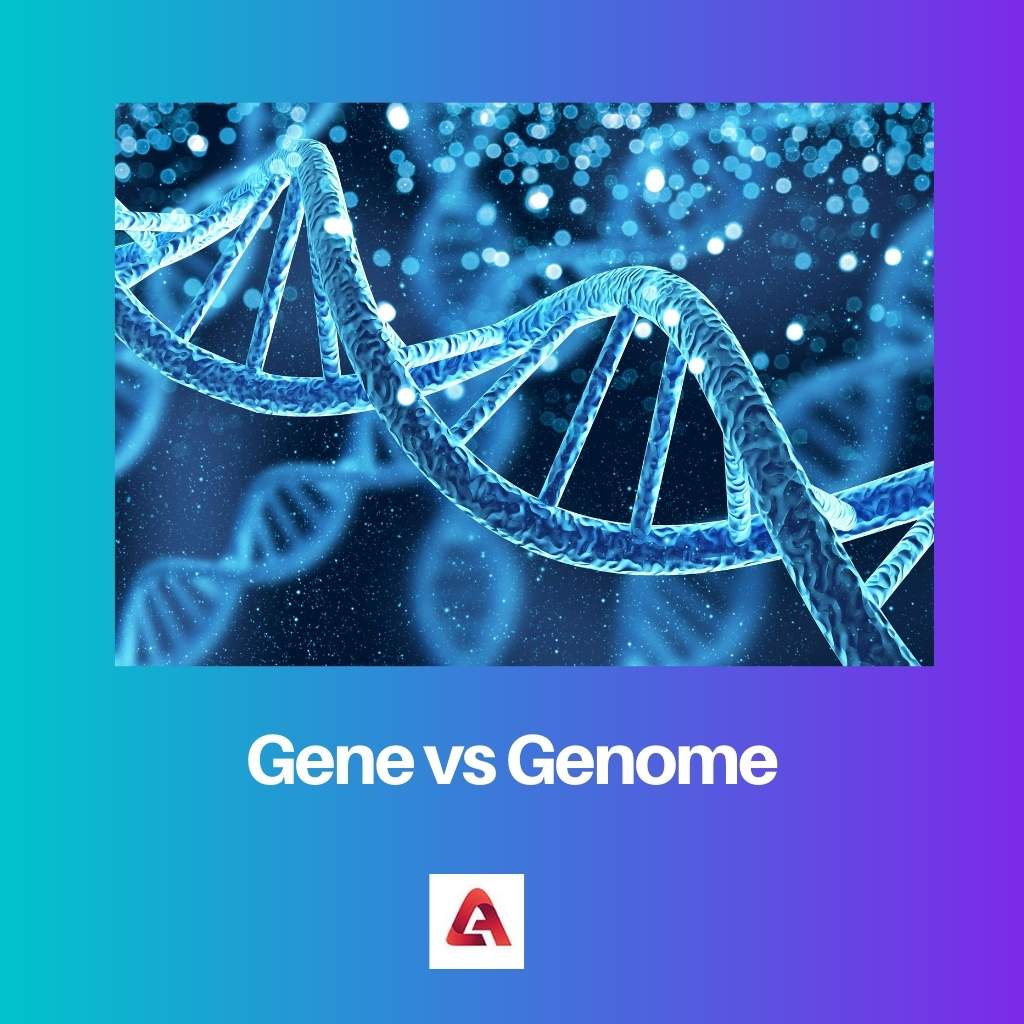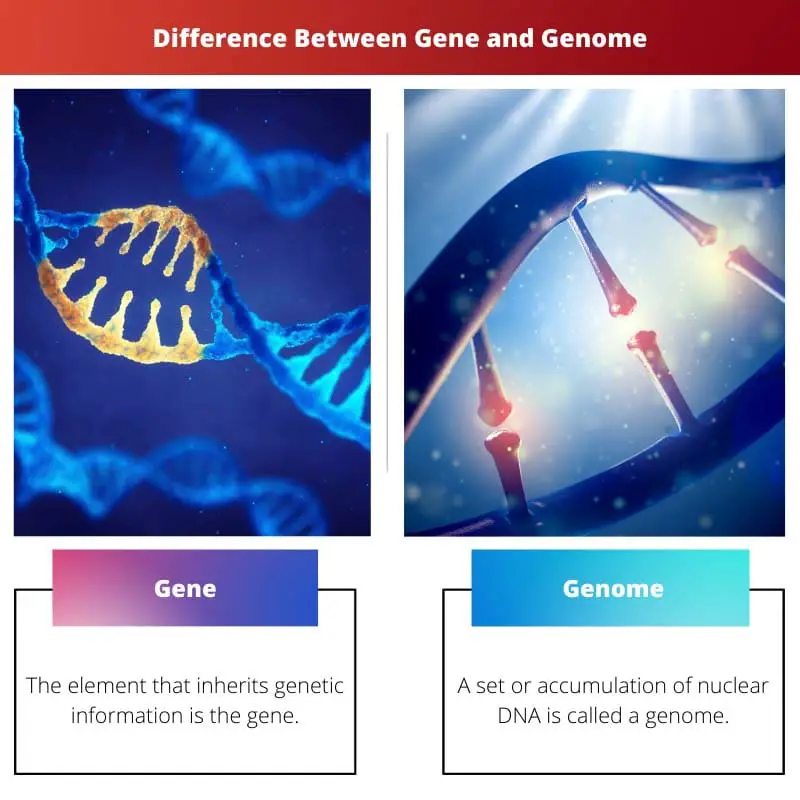A cell’s genetic information is stored chemically in RNA or DNA. The genetic instructions are determined by the order in which the nucleotide bases are organized in the polynucleotide chain.
A gene is a nucleotide sequence that codes for a specific protein. The entire DNA molecules in humans contain thousands of genes.
An organism’s genome is made up of all of its nuclear DNA.
Key Takeaways
- A gene is a DNA segment containing instructions to make a specific protein, while a genome is the complete set of genetic material within an organism.
- Genes are responsible for specific traits or characteristics, whereas the genome represents an organism’s genetic blueprint.
- Studying individual genes helps researchers understand the role of specific proteins while analyzing the genome provides insight into the bigger picture of an organism’s genetics.
Gene vs Genome
A gene is a specific sequence of DNA that contains the instructions for making a specific protein or set of proteins. In other words, a gene is a functional unit of heredity that determines a particular trait or characteristic. A genome is the complete set of genetic material in an organism. The genome includes all the genes, as well as other non-coding DNA sequences, that make up an organism’s genetic code.

A gene is a little piece of DNA that makes up the entire molecule. Because the primary goal of a gene is to convey information, it also codes for protein production.
The length of a gene consists of hundreds of different bases. There are thousands of genes in a higher organism.
Alleles are a type of genetic variation that can be spontaneously selected. Genetics is the term for the branch of science that studies genes and their properties.
The entire DNA present inside a cell is considered the genome. The components that control protein production, as well as the proteins, can be encoded by the genome—the base pairs in the genome number in the billions.
Only one genome exists in each organism. Genome variation is mostly caused by duplication and horizontal gene transfer. Genomic science is the scientific study of the genome and its properties.
Comparison Table
| Parameters of Comparison | Gene | Genome |
|---|---|---|
| Definition | The element that inherits genetic information is the gene. | A set or accumulation of nuclear DNA is called a genome. |
| Content it contains | A small part of the molecule of DNA. | It is the whole DNA present inside a cell. |
| Encodes | Protein. | Elements that regulate protein synthesis, proteins. |
| Length | Hundred of bases. | Billion of bases. |
| Number | Thousand of genes. | One genome only. |
| Name of study | Genetics | Genomics |
What is Gene?
The gene is the element that inherits genetic information. It’s a chromosome within a chromosome. A gene is a very small component of the DNA molecule.
Because the primary function of a gene is to convey information, it also codes for protein production. The length of a gene is composed of hundreds of bases.
The number of genes found in a higher creature is in the thousands. Alleles are a type of gene variant that can be selected spontaneously.
Genetics is the name of the field of study that deals with genes and their properties.
On the strand of DNA polynucleotide, a gene is a sequence stretch or locus. It is known as the molecular unit of heredity because it encodes an amino acid sequence of a certain protein.
Genes transmit genetic instructions to children through reproduction. In higher creatures, a single DNA molecule can contain thousands of genes.

What is Genome?
The genome refers to a collection of nuclear DNA. DNA, like chromosomes, is present in the majority of cases. The entire DNA present inside a cell is referred to as the genome.
The genome can encode both the components that control protein synthesis and the proteins themselves.
The genome is made up of billions of base pairs. Every creature is made up of only one genome.
The main source of variation in genomes is horizontal gene duplication and transfer. The study of the genome and its properties is referred to as genomics.
The genome refers to an organism’s whole collection of nuclear DNA. Although some viruses have RNA genomes, the majority of genomes are made up of DNA.
Organelles like chloroplast and mitochondria have their genomes, which are referred to as chloroplast genomes and mitochondrial genomes, respectively.

Main Differences Between Gene and Genome
- The element that inherits genetic information is the gene. It is located inside the chromosome. On the other hand, a set or accumulation of nuclear DNA is called a genome. The majority of the time, like chromosomes, DNA exists.
- A gene is only a small part of the molecule of DNA. On the other hand, the genome is considered as the whole DNA present inside a cell.
- As the main motive of genes is information transfer, thus it encodes the synthesis of protein. On the other hand, the genome is capable of encoding the elements that regulate protein synthesis and the proteins as well.
- Gene’s length comprises bases of about some hundred in number. On the other hand, the genome comprises base pairs of some billions in number.
- The number of genes a higher organism constitutes is a thousand in number. On the other hand, every organism constitutes one genome only.
- Alleles are in the form of variations of genes, which can be selected naturally. On the other hand, duplication and transfer of genes horizontally cause the main variation in genomes.
- The name of the study that deals with the gene and its properties is called genetics. On the other hand, the name of the study of the genome and its properties is called genomics.

- https://academic.oup.com/bioinformatics/article-abstract/26/18/2334/208255
- https://onlinelibrary.wiley.com/doi/abs/10.1111/brv.12104

The in-depth analysis of genes and genomes in this article is commendable. It serves as a valuable resource for individuals interested in understanding the genetic components and their broader implications.
Absolutely, the elucidation provided here aids in a clearer comprehension of how genes and genomes function within living organisms. It’s a well-structured source of information in genetics.
I completely agree. The detailed explanations of genetic elements and their functions make this article an excellent reference for educational and research purposes.
This article provides a comprehensive insight into the distinctions between genes and genomes, offering clarity on fundamental genetic concepts. It’s a valuable source of knowledge for both students and researchers in genetics.
Indeed, the detailed comparison of genes and genomes helps in solidifying the understanding of genetic information and its organization within living organisms.
The thorough explanations of genetic components found in this article are highly beneficial for educational and research purposes. It provides a clear understanding of the roles genes and genomes play.
The comprehensive explanation of genes and genomes here is an excellent resource for those looking to expand their knowledge in genetics. This article succinctly highlights the fundamental characteristics and functions of these genetic elements.
I found the comparison table to be particularly helpful in summarizing the distinctions between genes and genomes. It’s a great resource for educational purposes and scientific understanding.
I couldn’t agree more. The clarity provided in distinguishing genes and genomes is extremely beneficial for researchers and students alike in the field of genetics.
The explanations provided for genes and genomes in this article are very informative. It helps in comprehending the fundamental genetic units and the larger set of genetic material within an organism, offering a clear distinction between the two.
Agreed. The detailed description of gene and genome functions and characteristics is enlightening. It’s a great source for those seeking in-depth knowledge of genetics.
I concur. This article effectively presents the intricate details of genes and genomes, providing valuable insights into the genetic blueprint of an organism.
The distinction between genes and genomes, as outlined in this article, is crucial in understanding the genetic makeup of living organisms. It’s a foundational piece of information for anyone studying genetics.
The distinction between a gene and a genome is fundamentally the difference between a single unit of heredity and the entire set of genetic material. Understanding this is crucial for further research and study in the field of genetics.
I agree, it’s important to be clear on what we mean by each of these terms in order to avoid confusion or incorrect assumptions in genetic research.
The distinction between genes and genomes outlined here is essential. It helps in understanding the complexities of genetic information and how it is organized within an organism. Thank you for providing such thorough information on this topic.
Absolutely, the detailed description of gene and genome functions and differences is valuable for anyone interested in genetics. It’s a great reference for scientific education and research.
The clear description of genes and genomes in this article is highly informative. It elucidates fundamental genetic concepts and their functions, serving as an excellent resource for individuals interested in genetic research and education.
Absolutely, the detailed explanations of gene and genome functions and characteristics offer a well-structured foundation for studying genetic material within living organisms.
I completely agree. The thorough delineation of genes and genomes in this article is beneficial for enhancing understanding of genetic elements and their roles in heredity and genetic variation.
This article provides a detailed explanation of the concepts of gene and genome, their differences and the functions they perform at a molecular level. It’s an excellent resource for those looking to deepen their knowledge in genetics.
The molecular level functions of genes and genomes are truly fascinating to study. This article provides a clear overview of these concepts that can benefit both students and researchers in genetics.
Indeed, this article offers valuable insight into these fundamental genetic elements. The comparison table is particularly helpful in summarizing the key differences between genes and genomes.
The detailed analysis of genes and genomes provided in this article is enlightening. It offers a comprehensive understanding of the genetic material and its organization within living organisms, making it an invaluable resource for scientific inquiry.
I agree. The article effectively outlines the differences between genes and genomes, providing a solid foundation for further exploration in the field of genetics.